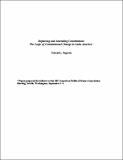|
Reseña:
|
Since 1978, all countries in Latin America have either replaced or amended their constitutions. What explains the choice between these two substantively different means of constitutional transformation? This article argues that the replacement of constitutions depends on the power-sharing features of constitutional design, the frequency of institutional crises, and the capacity of political actors to transform the constitution by means of amendments or judicial interpretation. It also argues that in a context of party pluralism, amendments can only be used as a means of constitutional change if amendment procedures are relatively flexible. The article provides statistical evidence to support these arguments and discusses the normative implications of the analysis. |

